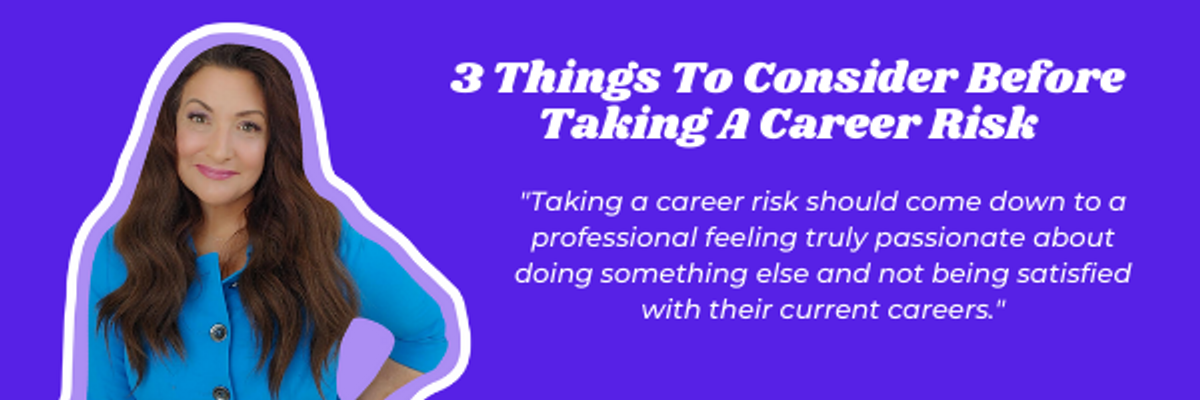
I recently read an interesting article from the New York Times about professionals going YOLO on their career.
For those who are not familiar, YOLO is an acronym for "you only live once," and has become a very prominent term in all walks of life, most recently with the stock market with individuals putting their life savings behind trendy stocks.
The article describes a career YOLO as leaving a stable job to start a new business, turning a side hustle into a full-time job, or making a really drastic career pivot.
As a career coach, reading this article put my thoughts in high gear.
First and foremost, I absolutely love the fact that people are thinking about their careers on a more holistic level. Professionals today, regardless of age, want a job where they feel they consistently add value, but also provide them equal value and an opportunity to enjoy life outside of work.
For too long, people have thought of their careers as a script that you follow where you pick a profession, stick to the job, pay the bills, and repeat the process. I have spent years as a career coach trying to change this mindset, so I'm pleased that professionals are starting to feel more empowered and motivated.
On the flip side, while I recognize that a certain amount of risk is required when making a career change, I also believe there's a right way to approach such risks and that throwing caution to the wind isn't the best strategy for everyone.
If you find yourself in a position where you're feeling empowered to take a career risk, it's important that you consider these important factors first.
Are You Taking The Risk For The Right Reasons?

Bigstock
Taking a career risk should come down to a professional feeling truly passionate about doing something else and not being satisfied with their current career.
If you're on the fence about making a change or have a problem that's fixable, I would suggest you take a pause.
For example, a few professionals interviewed in the New York Times article stated that they're ready to move on from their career because they don't want to go back to the way things were before, and in some cases, their bosses are mandating a return to the office.
If you're already unhappy at your job and you get this mandate, then it's understandable why you may finally be ready to move on and make a change. But, if you otherwise enjoy your job, then make a case to your boss for remote work.
An office-wide mandate isn't necessarily the end of the story. Request a 1-on-1 meeting with your boss where you can outline your reasons for wanting to work remotely and have quantifiable examples ready to go about why you're a better employee working remotely.
You should also ask yourself if you're willing to consider other negotiables, such as a hybrid work arrangement, increased schedule flexibility, or other enhanced benefits.
If you and your boss can't come to some sort of compromise, or your boss is very dismissive, then it very well may be time to move on. At least you made an effort.
Other professionals are being inspired to take extreme career risks because they see others doing it and having success. Everyone has their own unique career story and, while it may appear that your acquaintance threw caution to the wind and ended up a success, ask yourself, "Do I really know that person's entire story?"
Ultimately, taking a career risk is a very personal choice and everyone's level of risk is different.
Do You Have A Strong Support Structure In Place?
@j.t.odonnell Reply to @blaynp BEFORE YOU CHANGE JOBS, DO THIS 1 THING!!! #careerchange #jobchange #careeradvice #careertiktok #careercoach #careertips #ZodiacSign
Some professionals have the in-demand skills and financial capital to take immediate risks and capitalize on the current market. Those professionals have every right to take that leap and they should absolutely take advantage of their opportunity.
However, some professionals have to be a little more calculated before taking a giant career leap. This is where a strong support structure comes in handy.
Just because you've decided to take a career risk doesn't mean you have to do it alone!
Take a look at your professional network and see if there's anyone that can give you advice about career change, building a business, and the finances that go into starting your own business and being out of work for an extended period of time.
The financial counsel may be of particular importance. The New York Times reported that increased financial flexibility is another factor that's empowering some professionals to take career risks.
The combination of remote work and the COVID-19 pandemic limiting activity resulted in some people being able to save a lot of money. But, it's important to get a handle on how much financial freedom you actually do have. Money goes fast and going broke is an obstacle to making a career pivot.
Some will have the benefit of large savings, a spouse or partner with a good job, or financial support from family. But those who don't have these things need to know the potential financial ramifications of their decision.
As a career coach, I do encourage risks but I wouldn't want anyone going into a risk completely blind. Whatever guidance and support you can get along the way with financial and career planning will only increase the odds of success.
What Type Of Plan Do You Have In Place?

Bigstock
You may be asking yourself, "Doesn't all this talk about being calculated and cautious defeat the purpose of taking a risk?"
No! As I said earlier, every professional has their own unique circumstances to consider and I would advise everyone differently.
If I talk to a client about being calculated with risks and understanding the professional and financial challenges they face, it's not because I'm trying to discourage them from taking a risk. It's because I'm trying to empower them with enough information to help them find success.
Not all risks are created equal; some require a level of planning.
For example, let's say a professional accountant is tired of the everyday grind and took up a side hustle during the pandemic helping companies manage their social media accounts. During this time, that professional became passionate about social media management and wants to turn the side hustle into a full-time job. However, there is no shortage of professionals with experience in social media and this person doesn't have a lot of savings or financial backing to get themselves going.
While I would advise this person to follow their passion, they are not going to be able to make the jump without a little bit of planning. They need to determine:
- How to make their business stand out.
- Estimate how long it will take for their new business to be profitable.
- Determine how they're going to pay their bills in the interim.
If this person can come up with a plan to address these three areas, then they should definitely give it a shot. While there's no guarantee that the plan will be successful, it's a lot better than taking the risk with no plan at all.
Keep Reaching For Your Passions
The COVID-19 pandemic gave people an opportunity to pause and think about what's really important to them, and I am so happy that people are having these conversations and pursuing jobs that will fulfill them professionally and personally. If you're one of those lucky professionals who has found success with going YOLO on your career, I hope you'll mentor and offer advice to others.
There are risks that come with every major change and, while I'll encourage people to take risks with their careers, everyone has to manage their risks differently and consider their own personal circumstances.
A YOLO strategy won't work for everyone, but hopefully it offers inspiration to those professionals that are ready for a change.
- 4 Ways To Take Ownership Of Your Career - Work It Daily ›
- How To Successfully Change Careers After A Layoff ›
- 3 Challenges Job Seekers Face When Making A Career Change ... ›
- How To Use Risk Management To Combat The Impact Of COVID-19 - Work It Daily ›
- 4 Critical Components To Risk Management Success - Work It Daily ›
- How To Manage A Side Hustle (When You Work Full-Time) - Work It Daily ›

 Bigstock
Bigstock Bigstock
Bigstock Bigstock
Bigstock


